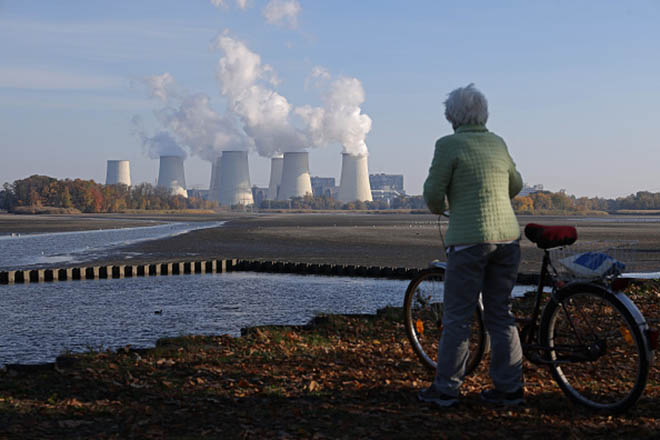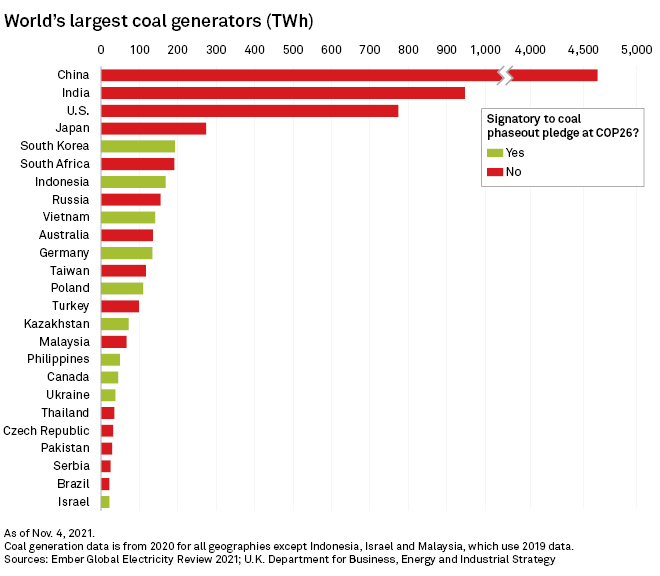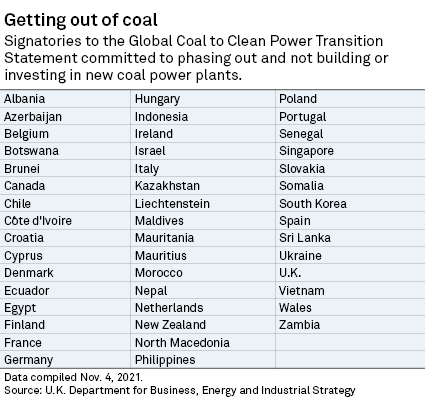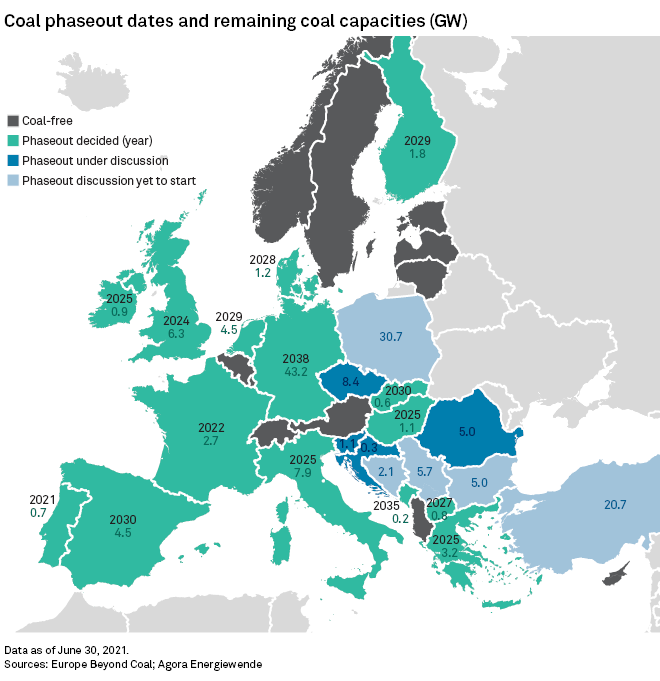S&P Global Offerings
Featured Topics
Featured Products
Events
S&P Global Offerings
Featured Topics
Featured Products
Events
S&P Global Offerings
Featured Topics
Featured Products
Events
Banking & Capital Markets
Economy & Finance
Energy Transition & Sustainability
Technology & Innovation
Podcasts & Newsletters
Banking & Capital Markets
Economy & Finance
Energy Transition & Sustainability
Technology & Innovation
Podcasts & Newsletters
S&P Global Offerings
Featured Topics
Featured Products
Events
4 Nov, 2021

By Camilla Naschert
 |
|
A woman standing near a coal-fired power plant in Germany. At COP26, major nations agreed to phase out coal-fired generation in the 2030s. |
To read all of our coverage of COP26, click here
A global agreement at the COP26 climate conference in Glasgow, Scotland, to phase out coal-fired power generation in several major economies will speed up the demise of the fossil fuel, climate experts said Nov. 4.
Forty-six nations, including three of the world's top 10 coal generators, pledged at the summit to phase out their coal fleets and stop building or investing in new capacity. Signatories to the Global Coal to Clean Power Transition Statement include South Korea, Indonesia, Germany and the U.K., as well as 23 countries that are committing for the first time to wean themselves off coal, such as Poland, Vietnam and Ukraine.
"These are enormous, enormous, enormous shifts in countries that, until very recently, saw reliance on coal as an absolute necessity and, in the case of Vietnam, were still going to expand it dramatically," Lauri Myllyvirta, a lead analyst at climate think tank Centre for Research on Energy and Clean Air, wrote on Twitter.
Under the agreement, major economies pledged to close their last remaining coal plants in the 2030s, while the rest of the world will close plants in the 2040s. Signatories also include 26 companies, including Electricité de France SA, Engie SA and Drax Group PLC.
In a separate announcement Nov. 4, the Powering Past Coal Alliance, a coalition of governments working to transition away from coal, unveiled 28 new members, including Ukraine, which has Europe's third-largest coal fleet, and Chile.
The breakthroughs follow China, Japan and South Korea, the three largest public financiers of coal, committing to end overseas finance for coal generation by the end of 2021, announced in recent months. Several major banks have also committed to ending the financing of unabated coal power.

'Rapid collapse'
Climate experts welcomed the news from Glasgow. "This is such a big moment because by far the biggest gap in ambition ... is a rapid collapse in coal generation," Dave Jones, global program lead at campaign group Ember, said in a statement, adding that entire continents are now en route to phasing out coal.
Signatories to the Global Coal to Clean Power Transition Statement include 10 of the world's top 25 largest coal generators, according to data from Ember. Notable absentees include the top four generators — China, India, Japan and the U.S.
In the U.S., political resistance to President Joe Biden's clean power program prevents the country from committing to phase out coal, Leo Roberts, fossil fuel transitions research manager at environmental group E3G, said during an online event Nov. 4.
 |
Yet U.S. Energy Secretary Jennifer Granholm underscored the U.S. government's commitment to decarbonization, evoking the promise of a thriving renewables industry. "It's all about growing the pie," Granholm said in Glasgow. "Our goal is not simply replacing one industry with another. ... The global market for clean energy technologies will be worth $23 trillion by 2030. That's what's on the other side of this transition."
After years of retreat from global climate action under the Trump administration, the U.S. is now doubling down on commitments and catching up with countries like the U.K., which are already much further along in their phaseout of coal, Granholm said. "We are eager to play our part. We are back, and we are ready to partner." Moving independently, the U.S. states of Hawaii and Oregon signed the coal exit pledge as sub-national actors.
European leaders are also pledging to leverage the transition for job creation and economic growth. "The current situation on the energy market is no reason to pause the coal exit. To the contrary," EU Energy Commissioner Kadri Simson said in Glasgow.
A coal phaseout in Poland, Europe's second-largest coal country, will go a long way to closing the chapter in Europe. The largest coal economy, Germany, is committed to a closure target of 2038 but could see its exit brought forward by an incoming coalition government featuring the Green Party.

'A new norm'
Limiting global temperature increases to 1.5 degrees C, as laid out in the Paris Agreement on climate change, requires the transition away from fossil fuels to progress four to six times faster than today, the U.K. government said in a Nov. 4 news release.
New analysis by the International Energy Agency shows that existing net-zero emissions targets and a pledge to curb methane emissions by 30% by the end of this decade, if implemented fully, would limit warming to 1.8 degrees, Fatih Birol, the agency's executive director, announced Nov. 4 on Twitter.
In this context, historic pledges being made by even some of the most coal-reliant nations show that "conditions are ripe" for a global coal exit, Roberts said. But with the phaseout agreement missing major coal generators such as China, India, the U.S. and Australia, there remains a significant global coal fleet not covered by closure plans.
Ultimately, the significance of the phaseout pact should still not be underestimated, Myllyvirta said.
"I would say politically and economically, it's as big a step for [certain signatories] to decide to phase out coal as it would be for China," Myllyvirta said. "It's setting a new norm."
